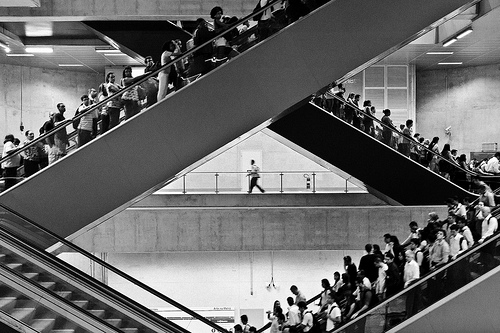You have no items in your cart. Want to get some nice things?
Go shopping
The first thing we notice about someone is their appearance. Before they open their mouths our eyes dart from facial features to clothes, as we note their gender and ethnicity amongst other things. Next is their voice, they have a Geordie accent, so we label them as a Northerner, their language isn’t as eloquent as our own, we think they are uneducated. And then we listen to what they are saying and discern what kind of a person they are, whether they are positive, negative, interesting, or funny. Our brains condense all of this information when we first meet someone, to form a picture of them, an identity for them before we even know them. Identity is a construct of society.
Stereotypes play a large role in how we define others as well as ourselves. By grouping people who share one particular attribute together, we strip them of their individuality, casting aside all other aspects of their identity and self. We each have multiple identities, some of which we keep private. A predetermined assumption of a person’s behaviour and interests on a basis of their stereotype is unhealthy, unhelpful and unnecessary, causing unwarranted distress.
Our consumerist culture has shaped our identities to be categorised into stereotypes. The media bombards us with images and ads to manipulate us to consume and to aspire to be one of their carefully constructed ‘beautiful people’. People rush to buy clothes from the latest popular store, everyone listens to the same music, watches the same films, reads the same books, and eats the same food. It’s a wonder any of us manage to retain any sort of individuality. Pressure to conform to stereotypes is particularly difficult for young people who are forming their identities and looking for their place in society. The want for acceptance, and the narrow band in which it lies causes trauma and isolation.
Appearance often forms identity, in both how we see ourselves and how others see us. If we see someone in a nice suit we assume they are wealthy, we see someone with jet black hair and black clothes we assume they are a goth. People are stereotyped by their looks, by how they keep themselves, and by the image they project. Different looks create instant identities: Chav, nerd, punk, Muslim. The difficulty lies here, if your identity is instantly recognisable because of religious beliefs, and is viewed negatively and associated with terrorism and extremism, as Muslims have found, it can be terrifying and marginalising. It can also lead to the radicalisation of groups, such as moderate Muslims.
We can take a lighter view on stereotyping. It can also be amusing and interesting. Cambridge University has recently published two years’ worth of research on regional identities. 400,000 people were surveyed to establish the personality of different regions in the UK. Each region has been given a different identity. Shy and emotionally unstable Wales, uncooperative and irritable London, and agreeable and stable Scotland, to take a few examples of the identities. It must be said that all who took part volunteered themselves and had to have access to the Internet, so the research is not without its limitations, obviously. This type of stereotyping can be amusing and light-hearted, but it is not without its difficulties. Who wants to labelled the emotionally unstable, unhappy, cranky region? Will we after taking the test morph into what we have been told we are or should be when living in a particular region? Will rudeness and unhelpfulness be seen as acceptable or justified just because our region is known for these traits?
But not all stereotypes are fun and games. These examples of stereotyping can lead to prejudice and the ostracism of different groups. There is a serious side to our stereotyping habits. Recent years have seen severe racial discrimination against Muslims. One could say that stereotyping leads to Muslims becoming radicalised and travelling to Syria, as we have seen five young girls from the UK do. In the West it seems that Muslims are grouped together, stereotyped into one category. Their other identities aren’t recognised, established or appreciated in society. The idea of belonging to a group such as ISIS and serving a purpose in that group is so enticing after being shunned by society due to beliefs.
Some may smirk superiorly at Daily Mail readers on the tube, who in turn may pity another’s ‘politically correct’ strangled use of language. Economics, genes, education and luck factor hugely in forging our identities. We do not start life on an even platform. Society has enabled us to change our identities from birth, to develop and immerse ourselves in new ways of thinking about identity, and we should encourage further free thinking. Who cares what we look like, what we eat, how we speak? Why should it affect who we are as a person?

About Isabel Gonzalez-Prendergast
Isabel is particularly interested in international literature, learning about different cultures and philosophies.




